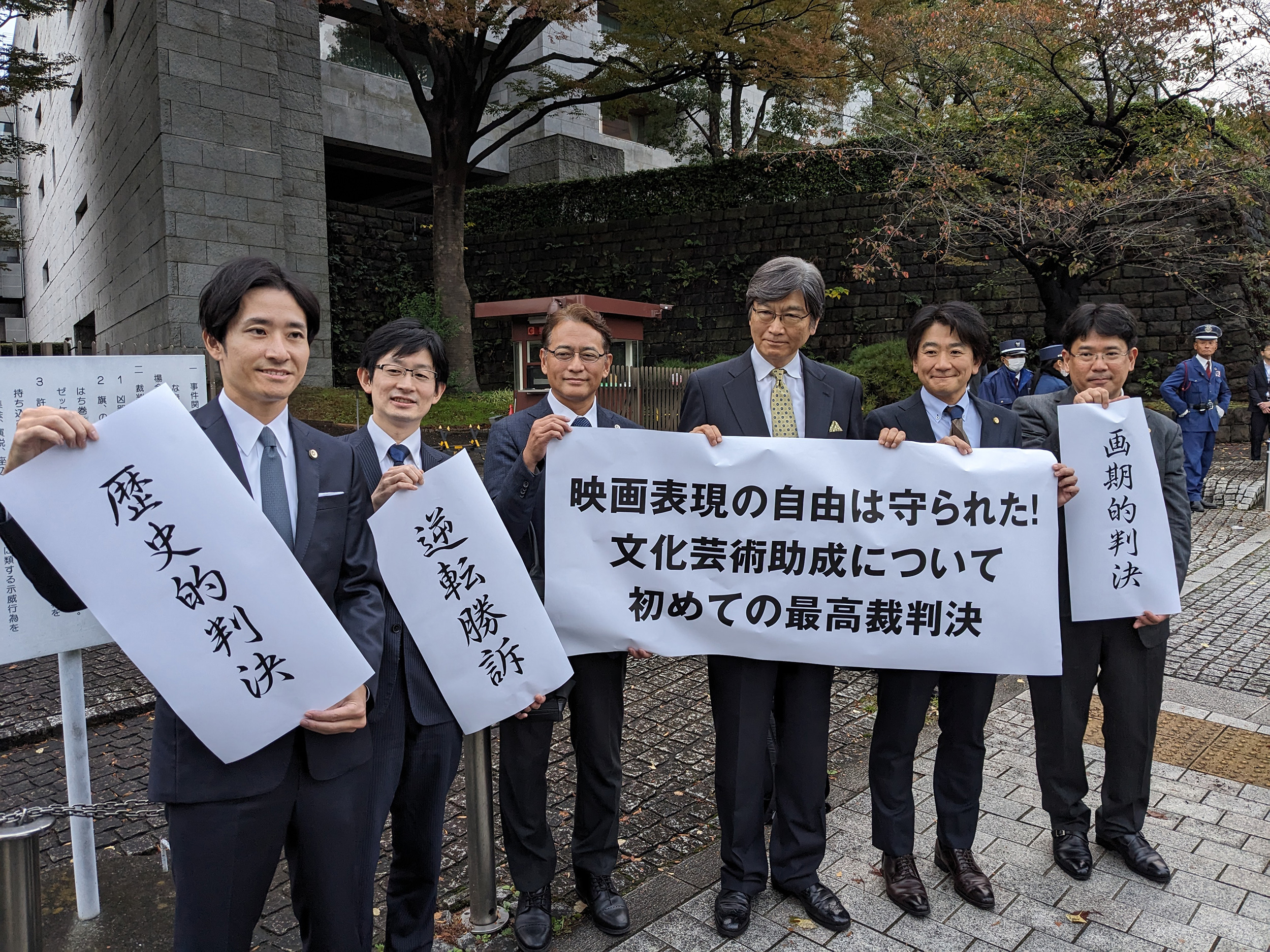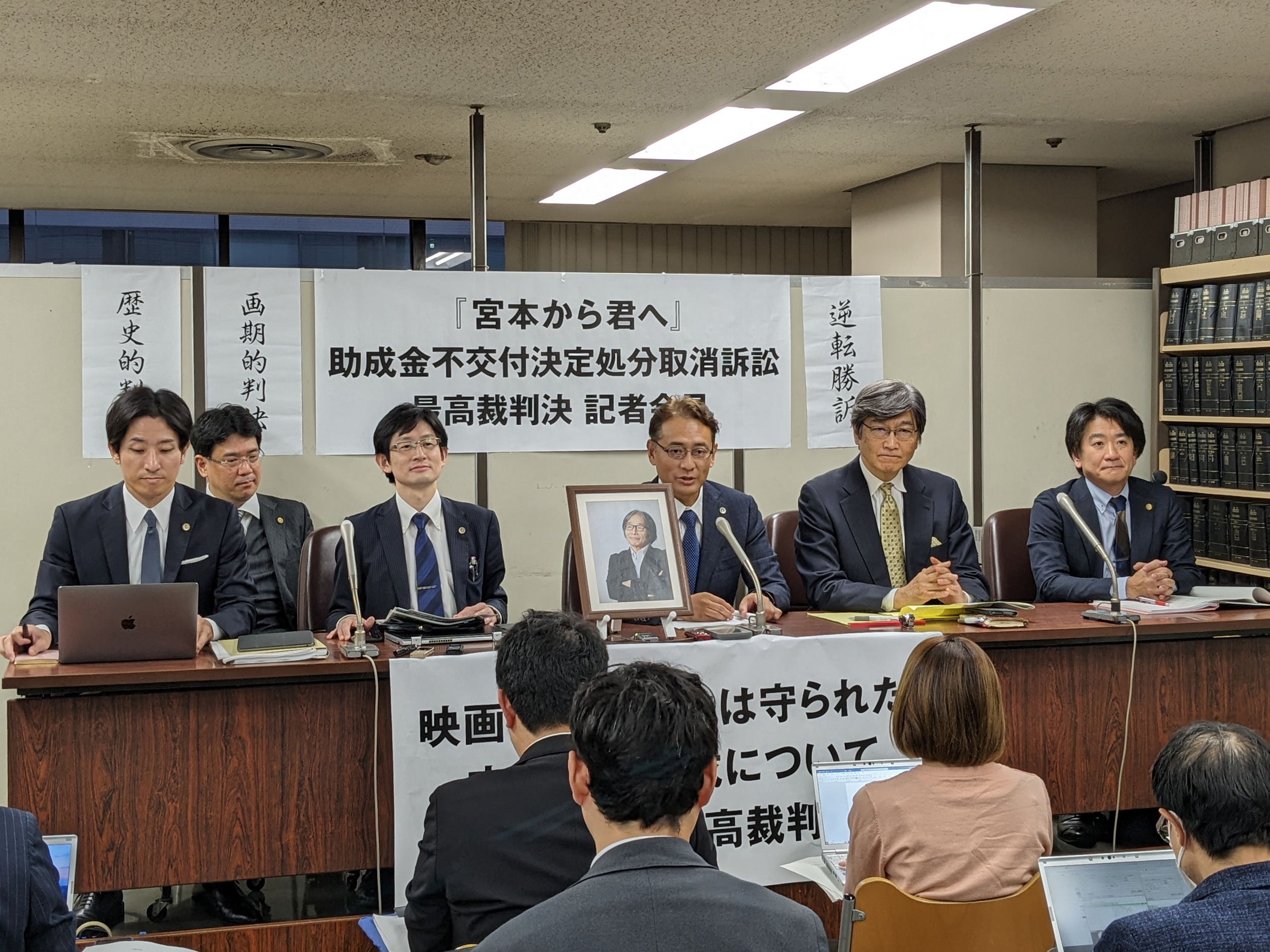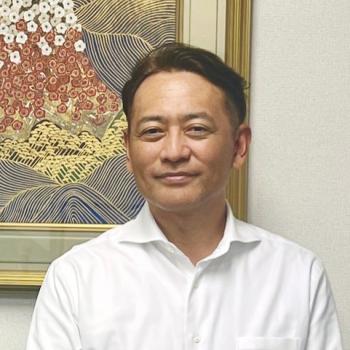Issue:
February 2024
Supreme Court rules against the Japan Arts Council and in favor of the arts

Foreign observers often decry the great reluctance of Japan’s Supreme Court to rule in favor of individual rights, especially free speech rights. But we must admit that sometimes the Court gets it right. This was surely the case when it ruled against a government agency and in favor of an independent filmmaker in November 2023.
The Japan Arts Council is a government agency best known for funding Japan’s traditional theatrical arts such as Noh, Bunraku, Kabuki and others1. Over the years, the scope of the Council’s work has expanded to promoting other forms of art, including opera, ballet, dance, and even, motion pictures.
Star Sands, an independent film production company launched in 2008, has commanded attention in recent years by fearlessly producing politically charged works that highlight scandals in the halls of government. The best-known is the award-winning Shimbun Kisha, a no-holds-barred fictionalized account of the Moritomo Gakuen case and other scandals that arose toward the end of the Shinzo Abe administration. Based on a book of the same title by Tokyo Shimbun reporter Isoko Mochizuki, Shimbun Kisha attracted so much attention that the film was entirely remade in series format for global distribution by Netflix under the title The Journalist2. Shimbun Kisha appeared in Japanese movie theaters less than two years after the actual events, while the story was still fresh in the public mind. The film enabled viewers to relive the Moritomo Gakuen scandal with intimate, albeit fictionalized, detail of the falsification of government records and the shocking suicide of an official ordered to do the dirty work.
Just as fans were crowding into Japan’s movie theaters to see Shimbun Kisha, Star Sands was preparing another film for release, the much less controversial Miyamoto kara kimi e (From Miyamoto to You).3 Based on a popular manga series, it delivers the story of an everyman hero and office romance.
Star Sands regularly applies for funding from the Japan Arts Council and sometimes succeeds. The Star Sands crew celebrated on the night of March 29, 2019, when they learned that an expert committee appointed by the council to vet proposals greenlighted their application for Miyamoto funding in the amount of ¥10 million. After receiving notice of the decision, Star Sands quickly applied for transfer of the funds … and then waited.
The delay was unusual, but perhaps not surprising. Pierre Taki, an actor who appears in Miyamoto, had been arrested on March 12 on drugs charges4. The arrest did not deter the expert panel from approving the award a little over two weeks later, but the council did not follow through with the money.
Star Sands pressed the Council for payment to no avail. Then, on June 28, two weeks after Tokyo District Court found Taki guilty, Star Sands executives received a visit from a three-person delegation from the council. The visitors asked whether Star Sands would re-shoot the film without Taki.
Reshoot the film?
One can easily imagine the shocked expressions and strident tones of the Star Sands executives who explained what this would entail. The actual filming had been completed in the autumn of 2018. A remake would require canceling contracts with theaters, re-hiring or finding a director, actors, and other staff, reserving locations, and completing all of the other work required to produce a new film.5 This was impossible.
On July 10, Star Sands received formal notice from the council that rescinded the grant. After noting Taki’s guilty verdict, the document explained that “to deliver payment of a grant from a government program would be inappropriate from the viewpoint of the public interest”.6
Miyamoto opened in theaters around Japan three months later, handicapped by the lack of funding for promotion and other work.
Star Sands filed a suit on December 20, 2019. Eighteen months later, a Tokyo District Court panel led by Judge Chieko Shimizu declared the grant cancelation unlawful and ordered the council to restore it.
In defense of its actions, the council had argued that approval of funding would send the message that the government tolerated drug abuse, and a permissive attitude toward illegal drug use would spread around Japan as a result. The court was skeptical of this claim. It pointed out that Taki was not one of the main actors in Miyamoto, appearing in only 11 minutes of the film’s 129-minute running time. Moreover, he was not featured in its promotion. The court said that the film and Taki’s arrest were unrelated, adding that it was unlikely that public funding would have a significant impact on the government’s reputation for strict enforcement of the drug laws.
The central legal question is whether the council’s chairperson had lawfully exercised her administrative authority when she canceled the payment. The court’s answer was clear: cancelation of the grant was an abuse of power that exceeded the bounds of the chairperson’s discretionary authority, and was therefore unlawful and must be rescinded.
But it was too early for another celebration. The council chose to appeal to Tokyo High Court, sometimes described as “the most conservative court in Japan”.7 A high court panel led by Judge Tetsu Adachi lived up to this billing. In a judgment issued on March 3, 2022, the court held that the Japan Arts Council chair had acted in the interest of preventing drug abuse and the funding cancelation was a proper exercise of administrative authority.

Takashi Shinomiya, lead counsel for Star Sands told me that, after the high court loss, his team was on the verge of giving up. Few Japanese attorneys would have much hope that the Supreme Court would overturn a Tokyo High Court judgment in a case related to creative speech. Ultimately, they did file an appeal with the Supreme Court and hoped for the best.
Their September 11, 2023 brief began with an homage to Mitsunobu Kawamura, the inspirational founder of Star Sands who had passed away at the age of 72 the previous summer. Kawamura forcefully declared his philosophy that the arts, including cinema, “should be free of all restrictions”.
The appellants suggested that Japan was moving in Kawamura’s direction. They noted that the Diet had passed legislation in 2017 that revised the fundamental cultural affairs law to stress the importance of autonomy and creativity in the arts. The revised law carried an express commitment to “stress freedom of expression” for the first time.8 The appellants did not hesitate to remind the court of the severe restrictions on expression in Japan’s past and argued that in today’s Japan, protecting the freedom of artists implies more than just the absence of government interference in content. It also requires fairness and transparency in the process of selecting proposals for financial support.
They attacked the council chairperson’s decision to invalidate the expert committee’s selection by relying on the vague standard of an undefined “public interest”. This was an arbitrary decision made behind closed doors. According to the appellants, “If the decision to approve or deny funding is based on vague criteria and opaque procedures, it is impossible to ensure the autonomy of culture and the arts.” Instead of focusing solely on their own vision, artists would have to check which way the wind is blowing in government offices.
As for the council’s fear that funding would lead people to conclude that the government tolerated drug abuse, the appellants asked: “Are the Japanese people really so stupid that they cannot distinguish such things? Contrary to the council’s rationale, there is strong public opinion that the work and the scandal are separate and that the work itself is blameless.”
They concluded their brief with the resounding claim that the cancelation “has had a major impact on the industry – exactly the opposite of the council’s mission to promote culture and the arts. For the sake of the promotion of culture and the arts in our country, this order should be rescinded. We believe that the court should send out a message that films should enjoy greater freedom”.9
The government replied that the council had acted reasonably, pointing out that Taki was “a famous actor who has appeared in many movies and TV dramas and was arrested and convicted. This was reported in daily newspapers and other media as a matter of great public concern.” Accordingly, the government said, “The council chairperson decided to deny the grant, which is funded by taxes collected from the public, after taking into account the public interest in preventing drug abuse … Such a decision cannot be overturned for lacking a factual basis or for lacking validity in light of socially accepted norms.”
There are 15 justices on Japan’s Supreme Court, but nearly all cases are decided by five-judge panels. The Miyamoto case was heard by the Second Petty Bench, led by Justice Akira Ojima, who has served as a judge throughout his career and was appointed to the Supreme Court in July 2022, four months after the high court judgment.
The Star Sands attorneys who filed into the Second Petty Bench courtroom on the afternoon of November 17, 2023 were surprised to hear Chief Justice Ojima declare that he and his colleagues ruled unanimously in favor of Star Sands.
The court homed in on the council’s assertion that it was acting in the “public interest”. It explained that because this is such a vague standard, it must be applied with great care. Of course, there are many different kinds of public interest. The council was concerned with the risk of expanded drug use, but the court itself was concerned with a very different public interest: freedom of expression.
In the court’s opinion, “If there is widespread denial of grants on the grounds that the public interest will be harmed, there could be a chilling effect on the creative work of those who apply for funding.” If this occurred, it would cause damage not only the council’s mission, but also to the artists themselves. “In light of the freedom of expression guaranteed by the constitution,” the court could not overlook this potential damage to the “artists’ autonomy and creativity”.
The court then laid down a two-part test: government action based on the vague public interest standard should be upheld only when the public interest is an important one, and there is a “concrete danger” that this interest will be harmed.
Did the council’s action pass this test? Surely, the prevention of illegal drug use is an important public interest. However, the court gave short shrift to the council’s claim that funding Miyamoto presented a “concrete danger”. The court said: “We do not see any basis for the conclusion that funding will lead to the general spread of a permissive attitude toward drug use and increased number of drug users and therefore would present a concrete danger that the public interest in preventing drug abuse will be harmed.”
In conclusion, the court held that the council’s action had been “extremely inappropriate”, and therefore unlawful.
At a press conference held after the court’s announcement, lead attorney Shinomiya said: “This was a little case about a little movie, but it led to a historic judgment that reminded us of the ‘freedom of expression’ guaranteed by the constitution as it raised questions about how the government addresses free speech and the arts.”10
The decision was widely applauded in Japan’s news media. On the day the judgment came down, famed independent journalist Shoko Egawa commented that it would “apply the brakes” to “opaque administration.”11 An editorial in the Asahi Shimbun said: “This is a historic judgment. Government agencies often win lawsuits that challenge their actions because they are allowed a wide range of discretion. Recognizing the importance of freedom of speech, this judgment places limits on such discretion.”12
The Asahi also reminded its readers of the controversy spawned by the After Freedom of Expression exhibition at the Aichi Triennale that also played out in the summer of 2019 and involved the sudden rescission of promised government funding.13 The reality is that artistic activities in Japan often rely on government support. We can have confidence that funding decisions are made solely on artistic merit only if those decisions are made in a transparent manner.
The judgment is surely important, not only to Star Sands, but to others who seek funding for the arts and more broadly as well. But it leaves some questions unanswered.
Star Sands’ challenge to the Arts Council required courage. The company would soon be back at the council’s offices to apply for grants to support other projects. And the controversy arose in the first place because Star Sands refused the council’s demand to create a new film with Taki’s scenes deleted. In fact, other producers of a film and a television drama in which Taki had roles did exactly that.14 Is this an appropriate way to deal with illegal drug use?
One might also ask what really motivated the council chairperson to pull the funding. Shinzo Abe did not vacate the prime minister’s chair until September, 2020. He was still smarting from public exposure of his wife’s involvement in the Moritomo Gakuen land deal scandal when Star Sands reminded the nation of the whole sordid mess with release of Shimbun Kisha. Is it possible that there was a secret order from on high to administer some penalty to the upstart filmmaker?

Attorney Shinomiya doesn’t think so. When I asked him about this, he responded that the action was more likely another example of sontaku – a word that became familiar during the Moritomo affair. Did the Ministry of Finance official who ordered the falsification of Moritomo documents act pursuant to some order from above? Well, he’s not saying, but most people seem to think that he didn’t need such an order. He knew what to do. Similarly, Shinomiya thinks it is unlikely that there was any direct interference in the council’s decision to cancel funding for Miyamoto. Instead, he suspects sontaku was the culprit. In his words, “even though there was no order, this is what we should expect”.
The Supreme Court judgment was clearly a victory for government transparency and against the abuse of power. Lawyers might say the judgment is most important because it sends the message that government officials should make decisions based on the law, not sontaku or other hidden commands. But the case concerns the delicate artistic process, so perhaps the late Mr. Kawamura should have the final word. According to his lawyers, he often said it was impossible to produce movies that showed the truth of contemporary society unless a variety of limitations are somehow pushed away.
Editor’s note: All translations from Japanese were made by the author. All source material is in Japanese.
Lawrence Repeta is the author of Japan's Prisoners of Conscience (Routledge, 2023) [https://www.routledge.com/Japans-Prisoners-of-Conscience-Protest-and-Law-During-the-Iraq-War/Repeta/p/book/9781032046266]
Sources
- 1. The Japan Arts Council (日本芸術文化振興会) is a satellite of the Ministry of Education and Culture. The Council’s website is here: https://www.ntj.jac.go.jp/en/.
- 2. For more on Isoko Moriguchi, see Justin McCurry, “Isoko Mochizuki, the 'troublesome' thorn in Shinzo Abe's side,” December 26, 2019. https://www.theguardian.com/world/2019/dec/27/isoko-mochizuki-the-troublesome-thorn-in-shinzo-abes-side.
- 3. As I write this, The Journalist is available on Netflix in the United States.
- 4. Taki pleaded guilty and on June 18, 2019 was sentenced to eighteen months imprisonment, sentence suspended, by Tokyo district court. Thus, he was not required serve time in prison.
- 5. According to the complaint filed in Tokyo District Court, some other producers of films and television programs did delete Taki’s scenes and replace them with newly filmed replacements. One special challenge faced by Star Sands concerned an actor who gained thirty kilos to play his role. With his body weight back to normal, he would have to go through the weight-gaining ordeal all over again.
- 6. This quotation from the June 28 notice and other factual details of the story are recorded in the Tokyo District Court judgment, available at https://www.call4.jp/info.php?type=items&id=I0000095. The Call4 website provides a comprehensive collection of legal documents, from the filing of the complaint through the final judgment of the Supreme Court. I relied on these documents throughout this essay.
- 7. Tokyo high court serves as a proving ground for judicial appointments to the Supreme Court. All six of the career judges currently serving on the Supreme Court previously served on the Tokyo high court. Four of them held the post of Tokyo high court “Chief Judge.”
- 8. The complete statute is here. https://elaws.e-gov.go.jp/document?lawid=413AC1000000148
The Tokyo Arts Council published a comment on the 2017 revision here:
https://www.artscouncil-tokyo.jp/ja/blog/22797/
https://www.bunka.go.jp/seisaku/bunka_gyosei/shokan_horei/kihon/geijutsu_shinko/kihonho_kaisei.html
- 9. Kawamura passed away on June 11, 2022 one month after this brief was filed.
- 10. Shinomiya was quoted in an NHK article which is no longer available on the Internet.
- 12. https://digital.asahi.com/articles/DA3S15796372.html The Mainichi published its positive editorial in English: https://mainichi.jp/english/articles/20231122/p2a/00m/0op/006000c
- 13. For details, see David McNeill, “Freedom Fighting: Nagoya’s censored art exhibition and the “comfort women” controversy, October 15, 2019. https://apjjf.org/2019/20/McNeill.html.
- 14. According to the District court judgment, his scenes were cut and he was replaced with other actors in the NHK “Taiga Drama” Idaten and the film Inemuri Iwane, among actions taken to ostracize the actor from Japan’s entertainment world.

